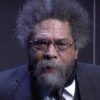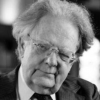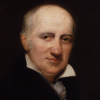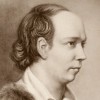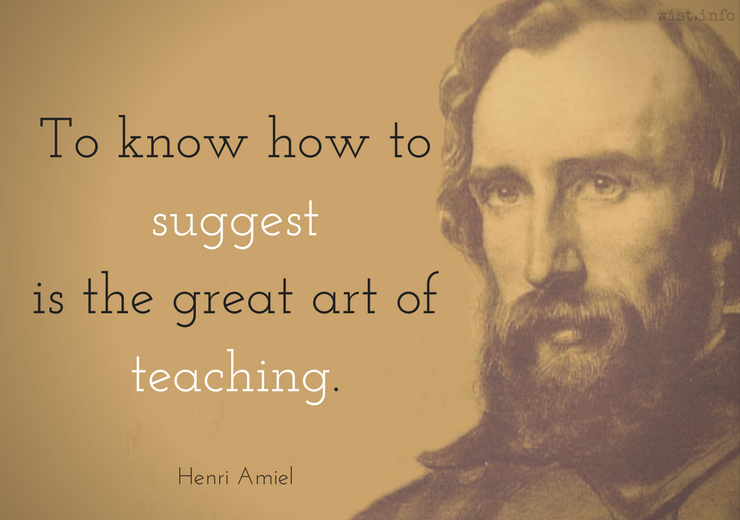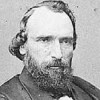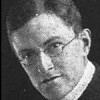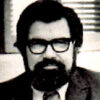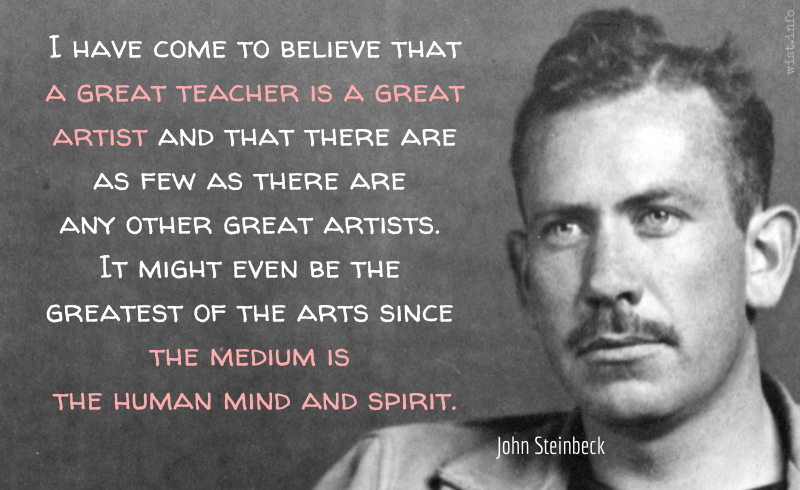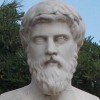Only if a child feels right can he think right.
Haim Ginott (1922-1973) Israeli-American school teacher, child psychologist, psychotherapist [b. Haim Ginzburg]
Teacher and Child, ch. 4 “Congruent Communication” (1972)
(Source)
Quotations about:
teaching
Note not all quotations have been tagged, so Search may find additional quotes on this topic.
Writing, printing, and the Internet give a false sense of security about the permanence of culture. Most of the million details of a complex, living culture are transmitted neither in writing nor pictorially. Instead, cultures live through word of mouth and example. That is why we have cooking classes and cooking demonstrations, as well as cookbooks. That is why we have apprenticeships, internships, student tours, and on-the-job training as well as manuals and textbooks. Every culture takes pains to educate its young so that they, in their turn, can practice and transmit it completely. Educators and mentors, whether they are parents, elders, or schoolmasters, use books and videos if they have them, but they also speak, and when they are most effective, as teachers, parents, or mentors, they also serve as examples.
Jane Jacobs (1916-2006) American-Canadian journalist, author, urban theorist, activist
Dark Age Ahead, ch. 1 “The Hazard” (2004)
(Source)
Teachers are expected to reach unattainable goals with inadequate tools. The miracle is that at times they accomplish this impossible task.
Haim Ginott (1922-1973) Israeli-American school teacher, child psychologist, psychotherapist [b. Haim Ginzburg]
Teacher and Child, Preface (1972)
(Source)
I have come to the frightening conclusion that I am the decisive element in the classroom. It is my personal approach that creates the climate. It is my daily mood that makes the weather. As a teacher, I possess a tremendous power to make a child’s life miserable or joyous. I can be a tool of torture or an instrument of inspiration. I can humiliate or humor, hurt or heal. In all situations, it is my response that decides whether a crisis will be escalated or de-escalated, a child humanized or de-humanized.
Haim Ginott (1922-1973) Israeli-American school teacher, child psychologist, psychotherapist [b. Haim Ginzburg]
Teacher and Child, Preface (1972)
(Source)
Quoting his writing as a young teacher.
Just as eating contrary to the inclination is injurious to the health, study without desire spoils the memory, and it retains nothing that it takes in.
Leonardo da Vinci (1452-1519) Italian artist, engineer, scientist, polymath
MS. 2038, Bib. Nat. 34 r. [tr. McCurdy (1908)]
(Source)
They loved their wives, and were beloved by them. Their entire attention was directed to educating their children in the ways of virtue; the miseries of their fellow countrymen were constantly represented to them and held up as the sorriest of examples. Above all, they were taught that individual interest is always bound to the common interest, that to try to separate them was to invite ruin, that virtue is not something costly to achieve nor painful to exercise, and that justice for others is a blessing for ourselves.
They soon had the consolation of virtuous fathers, seeing their children develop in their image.[Ils aimoient leurs femmes, et ils en étoient tendrement chéris. Toute leur attention étoit d’élever leurs enfants à la vertu. Ils leur représentoient sans cesse les malheurs de leurs compatriotes, et leur mettoient devant les yeux cet exemple si touchant ; ils leur faisoient surtout sentir que l’intérêt des particuliers se trouve toujours dans l’intérêt commun ; que vouloir s’en séparer, c’est vouloir se perdre ; que la vertu n’est point une chose qui doive nous coûter ; qu’il ne faut point la regarder comme un exercice pénible ; et que la justice pour autrui est une charité pour nous.
Ils eurent bientôt la consolation des pères vertueux, qui est d’avoir des enfants qui leur ressemblent.]Charles-Lewis de Secondat, Baron de Montesquieu (1689-1755) French political philosopher
Persian Letters [Lettres Persanes], Letter 12, Usbek to Mirza (1721) [tr. Healy (1964)]
(Source)
In the story of the Troglodytes, a tribe who had been decimated by a plague after years of self-interested anarchy where every person did as they wished. The survivors developed a philosophy of mutual aid and community, and prospered.
(Source (French)). Alternate translations:
They lov'd their Wives, and were tenderly belov'd by them. They were wholly intent upon educating their Children to Virtue. They continually represented to them the Calamities of their Countrymen, and often set that moving Example before their Eyes. They above all things instill'd into them this Principle, that every private Man's Interest is inseparable from the Interest of the Community. To divide it, is Ruin. That Virtue is not a thing which should be troublesome to us, nor ought the Exercise of it to give us pain; and that Justice to another, is Charity to our selves.
They had soon the Consolation of virtuous Fathers; which is, to have Children like themselves.
[tr. Ozell (1736)]
They loved their wives, and were affectionately beloved by them. The training up their children to virtue engaged their utmost care. They continually represented to them the miseries of their countrymen, and placed their melancholy example before their eyes. They especially inculcated upon their minds, that the interests of individuals was always to be found in that of the community, and that to attempt to seek it separately was to destroy it; that virtue is by no means a thing that ought to be burdensome to us, nor the practice of it considered as painful; that doing justice to others is acting charitably to ourselves. They soon enjoyed the consolation of virtuous parents, which consists in having children like themselves.
[tr. Floyd (1762)]
They loved their wives, and were beloved most tenderly. Their utmost care was given to the virtuous training of their children. They kept before their young minds the misfortunes of their countrymen, and held them up as a most melancholy example. Above all, they led them to see that the interest of the individual was bound up in that of the community; that to isolate oneself was to court ruin; that the cost of virtue should never be counted, nor the practice of it regarded as troublesome; and that in acting justly by others, we bestow blessings on ourselves.
They soon enjoyed the reward of virtuous parents, which consists in having children like themselves.
[tr. Davidson (1891)]
They loved their wives, and were in turn tenderly beloved by them. Their whole ambition was to rear their children virtuously. They constantly placed before their eyes the misfortunes of their fellow-countrymen, and proved to them by this thrilling example that the interest of the individual is one with the interest of the community; that to attempt to separate them is to court ruin; that virtue is a thing the practice of which ought to be found easy; that we should never regard its cultivation as a painful exercise, and that justice to others is a blessing to ourselves. They had soon the consolation of virtuous fathers, which is to see their children grow up in their likeness.
[tr. Betts (1897)]
They loved their wives, who cherished them tenderly in return; they devoted their whole attention to raising their children in the path of virtue; they told them repeatedly of the misfortunes of their compatriots, and showed them those piteous examples; above all, they made them feel that the interest of the individual is always identical with the common interest, and that to attempt to separate oneself from it is fatal; that we should not find virtue arduous, or regard it as a painful exercise, and that justice to another is a charity to oneself.
Soon they knew the consolation of virtuous fathers, which is to have children like themselves.
[tr. Mauldon (2008)]
They loved their wives, who in turn cherished them. Their great aim was to raise their children in the path of virtue. They constantly told them stories about their compatriots, putting that unhappy example before their eyes. Above all, they stressed that one;s self0--interest is always contained within the common interest, and that to separate those two was to take a step toward ruin; they taught also that virtue need cost us nothing, that we must not regard virtue as a painful burden; finally, they taught that to do justice for one is to do good for all.
In time they enjoyed the consolation of virtuous fathers, which is to have children who resemble them.
[tr. MacKenzie (2014)]
A reference or teaching book is only as good as its index.
I remind young people everywhere I go, one of the worst things the older generation did was to tell them for twenty-five years “Be successful, be successful, be successful” as opposed to “Be great, be great, be great”. There’s a qualitative difference.
For what greater or better service can we render to our country, than by thus educating and instructing the rising generation, especially in times like these, and in the present state of morality, when society has fallen into such disorders as to require everyone to use his best exertions to check and restrain it?
[Quod enim munus rei publicae afferre maius meliusve possumus, quam si docemus atque erudimus iuventutem, his praesertim moribus atque temporibus, quibus ita prolapsa est, ut omnium opibus refrenanda atque coercenda sit?]
Marcus Tullius Cicero (106-43 BC) Roman orator, statesman, philosopher
De Divinatione [On Divination], Book 2, ch. 2 (2.2) / sec. 4 (44 BC) [tr. Yonge (1853)]
(Source)
(Source (Latin)). Alternate translation:
For what greater or better service can I render to the common wealth than to instruct and train the youth -- especially in view of the fact that our young men have gone so far astray because of the present moral laxity that the utmost effort will be needed to hold them in check and direct them in the right way?
[tr. Falconer (1923)]
What nobler employment, or what more advantageous to the state, than that of the man who instructs the rising generation!
[Source (<1864)]
Teaching literature is impossible; that is why it is difficult.
Northrop Frye (1912-1991) Canadian literary critic and literary theorist
“Criticism, Visible and Invisible,” Lecture, Trinity College, Hartford (1964)
(Source)
Reprinted in College English (Oct 1964), and in The Stubborn Structure, Part 1, ch. 6 (1970).
If today you can take a thing like evolution and make it a crime to teach it in the public school, tomorrow you can make it a crime to teach it in the private schools, and the next year you can make it a crime to teach it to the hustings or in the church. At the next session you may ban books and the newspapers. Soon you may set Catholic against Protestant and Protestant against Protestant, and try to foist your own religion upon the minds of men. If you can do one you can do the other. Ignorance and fanaticism is ever busy and needs feeding. Always it is feeding and gloating for more. Today it is the public school teachers, tomorrow the private. The next day the preachers and the lectures, the magazines, the books, the newspapers. After a while, your honor, it is the setting of man against man and creed against creed until with flying banners and beating drums we are marching backward to the glorious ages of the sixteenth century when bigots lighted fagots to burn the men who dared to bring any intelligence and enlightenment and culture to the human mind.
Teaching takes skill and education and dedication. Home schooling as an idea is on a par with home dentistry.
Dick Cavett (b. 1936) American writer and critic
“Schooling Santorum,”New York Times (24 Feb 2012)
(Source)
CHORUS: It won’t do you any harm, my Lord, to listen to him and see if what he says is wise. And you, too Haemon. Because both of you spoke well.
CREON: At our age? Should we allow a young little rooster to teach us wisdom?
HAEMON: Justice only. Young or old, one does not look at years but deeds.Χορός: ἄναξ, σέ τ᾽ εἰκός, εἴ τι καίριον λέγει,
μαθεῖν, σέ τ᾽ αὖ τοῦδ᾽: εὖ γὰρ εἴρηται διπλῇ.
Κρέων: οἱ τηλικοίδε καὶ διδαξόμεσθα δὴ
φρονεῖν ὑπ᾽ ἀνδρὸς τηλικοῦδε τὴν φύσιν;
Αἵμων: μηδὲν τὸ μὴ δίκαιον: εἰ δ᾽ ἐγὼ νέος,
οὐ τὸν χρόνον χρὴ μᾶλλον ἢ τἄργα σκοπεῖν.Sophocles (496-406 BC) Greek tragic playwright
Antigone, l. 724ff (441 BC) [tr. Theodoridis (2004)]
(Source)
Original Greek. Alternate translations:
CHORUS: Sire, thou shouldst learn where he has hit the mark:
Thou too from him: for both have spoken well.
KREON: And shall we, in our riper age, receive
Lessons in prudence from his youthful mind?
HÆMON: Is nought but what is just. If I am young,
'Tis meet to scan my purpose, not my years.
[tr. Donaldson (1848)]
CHORUS: If he says aught in season, heed him, King.
Heed thou thy sire too; both have spoken well.
CREON: What, would you have us at our age be schooled,
Lessoned in prudence by a beardless boy?
HAEMON: I plead for justice, father, nothing more.
Weigh me upon my merit, not my years.
[tr. Campbell (1873)]
CHORUS: My lord, 'twere wise, if thou wouldst learn of him
In reason; and thou, Haemon, from thy sire!
Truth lies between you.
CREON: Shall our age, forsooth,
Be taught discretion by a peevish boy?
HAEMON: Only in what is right. Respects of time
Must be outbalanced by the actual need.
[tr. Storr (1859)]
CHORUS: My king, it is right, if he speaks something appropriate, that you should learn from him and that you, in turn, Haemon, should learn from your father. On both sides there have been wise words.
CREON: Men of my age -- are we, then, to be schooled in wisdom by men of his?
HAEMON: Not in anything that is not right. But if I am young, you should look to my conduct, not to my years.
[tr. Jebb (1891)]
CHORUS: O King! if right the youth advise, 'tis fit
That thou shouldst listen to hi: so to thee
Should he attend, as best may profit both.
CREON: And have we lived so long, then, to be taught,
At last, our duty by a boy like thee?
HÆMON: Young though I am, I still may judge aright;
Wisdom in action lies and not in years.
[tr. Werner (1892)]
CHORUS: Sire, 'tis meet that thou shouldest profit by his words, if he speaks aught in season, and thou, Haemon, by thy father's; for on both parts there hath been wise speech.
CREON: Men of my age -- are we indeed to be schooled, then, by men of his?
HAEMON: In nothing that is not right; but if I am young, thou shouldest look to my merits, not to my years.
[tr. Jebb (1917)]
CHORAGOS: You will do well to listen to him, King,
If what he says is sensible. And you, Haimon,
Must listen to your father. -- Both speak well.
CREON: You consider it right for a man of my years and experience
To go to school to a boy?
HAIMON: It is not right
If I am wrong. But if I am young, and right,
What does my age matter?
[tr. Fitts/Fitzgerald (1939)]
CHORUS: There is something to be said, my lord, for this point of view,
And for yours as well; there is so much to be said on both sides.
CREON: Indeed! Am I to take lessons at my time of life
From a fellow of his age?
HAEMON: No lesson you need to be ashamed of.
It isn’t a question of age, but of right and wrong.
[tr. Watling (1947), l. 620ff]
CHORUS: Lord, if your son has spoken to the point
you should take his lesson. He should do the same.
Both sides have spoken well.
CREON: At my age I'm to school my mind by his?
This boy instructor is my master, then?
HAEMON: I urge no wrong. I'm young, but you should watch
my actions, not my years, to judge of me.
[tr. Wyckoff (1954)]
CHORUS: My lord, he has not spoken foolishly;
You each can learn something from the other.
CREON: What? Men of our age go to school again
And take a lesson from a very boy?
HAEMON: If it is worth the taking. I am young,
But think what should be done, not of my age.
[tr. Kitto (1962)]
LEADER: You'd do well, my lord, if he's speaking to the point,
to learn from him, and you, my boy, from him.
You are both talking sense.
CREON: So,
men our age, we're to be lectured, are we? --
schooled by a boy his age?
HAEMON: Only in what is right. But if I seem young,
look less to my years and more to what I do.
[tr. Fagles (1982)]
CHORUS: Sir, you should learn from him, if he is on the mark.
And you, Haemon, learn from your father. Both sides spoke well.
CREON: Do you really think, at our age,
We should be taught by a boy like him?
HAEMON: No. Not if I am in the wrong. I admit I'm young;
That's why you should look at what I do, not my age.
[tr. Woodruff (2001)]
CORYPHAEUS: Lord, it is fair, if he says something to the point, for you to learn,
and in turn for you from him. It has been well said well twice.
CREON: Are we at our age to be taught
in exercising good sense by a man of his age?
HAEMON: Yes, in nothing that is not just. Even if I am young,
you should not see my years more than my deeds.
[tr. Tyrell/Bennett (2002)]
CHORUS LEADER: My lord, if what he’s said is relevant,
it seems appropriate to learn from him,
and you too, Haemon, listen to the king.
The things which you both said were excellent.
CREON: And men my age -- are we then going to school
to learn what’s wise from men as young as him?
HAEMON: There’s nothing wrong in that. And if I’m young,
don’t think about my age -- look at what I do.
[tr. Johnston (2005), l. 820ff]
CHORUS: My lord, if someone speaks in season, you should learn, and you also, for both sides have spoken well.
CREON: At our age, taught reason by a man so young?
HAEMON: Taught nothing that is not just! If I am young, I do not need more time to study what's right.
[tr. Thomas (2005)]
One looks back with appreciation to the brilliant teachers, but with gratitude to those who touched our human feelings. The curriculum is so much necessary raw material, but warmth is the vital element for the growing plant and for the soul of the child.
Carl Jung (1875-1961) Swiss psychologist
“The Gifted Child” (1942), The Development of Personality, sec. 250 (1954) [tr. Hull]
(Source)
Translated from "Der Begabte," Psychologie und Erziehung (1946).
As the true object of education is not to render the pupil the mere copy of his preceptor, it is rather to be rejoiced in, than lamented, that various reading should lead him into new trains of thinking.
William Godwin (1756-1836) English journalist, political philosopher, novelist
The Enquirer, Essay 15 “Of Choice in Reading” (1797)
(Source)
The mediocre teacher tells. The good teacher explains. The superior teacher demonstrates. The great teacher inspires.
William Arthur Ward (1921-1994) American aphorist, author, educator
Thoughts of a Christian Optimist (1968)
(Source)
When you teach your son, you teach your son’s son.
The Talmud (AD 200-500) Collection of Jewish rabbinical writings
Seder Nashim, Kiddushin 30a
Paraphrase of "This serves to say to you that whoever teaches his son Torah, the verse ascribes him credit as though he taught him, and his son, and his son’s son, until the end of all generations" (alt. trans. "to him who teaches his son Torah, the Writ ascribes merit as though he had taught him, his son and his son's son until the end of all time!"). This is in turn referenced to Deut. 4:9.
It should be quite unnecessary to point the moral; the right telling of the story should be sufficient. Do not moralize, but let the facts produce their own moral in the child’s mind.
Bertrand Russell (1872-1970) English mathematician and philosopher
Education and the Good Life, ch. 11 (1926)
(Source)
Those masters who allege the incapacity of tender years, only tacitly reproach their own: those who are incapable of teaching young minds to reason, pretend that it is impossible. The truth is they are fonder of making their pupils talk well than think well; and much the greater number are better qualified to give praise to a ready memory than a sound judgment.
Oliver Goldsmith (1730-1774) Irish poet, playwright, novelist
The History of England; in a Series of Letters from a Nobleman to His Son, Letter 1 (1764)
(Source)
Good teaching is one-fourth preparation and three-fourths theatre.
Anybody who teaches a skill, which coaches do, is admirable. But sport doesn’t build character. Character is built pretty much by the time you’re six or seven. Sports reveals character. Sports heightens your perceptions. Let that be enough.
Heywood Hale Broun (1918-2001) American author, sportswriter, actor
In Ames Daily Tribune (16 Jan 1974)
Broun used a number of variations of this idea. It was more famously paraphrased in James Michener, Sports in America (1976), as "Sports do not build character. They reveal it." More discussion on this quote here.
The virtues, like the body, become strong more by labor than by nourishment.
What I mean is that if you really want to understand something, the best way is to try and explain it to someone else. That forces you to sort it out in your mind. And the more slow and dim-witted your pupil, the more you have to break things down into more and more simple ideas. And that’s really the essence of programming. By the time you’ve sorted out a complicated idea into little steps that even a stupid machine can deal with, you’ve learned something about it yourself.
If thou hast Knowledge, let others light their Candle at thine.
Thomas Fuller (1654-1734) English physician, preacher, aphorist, writer
Introductio ad Prudentiam, #1784 (1727)
(Source)
Often misattributed to Margaret Fuller or Winston Churchill, frequently in modern English, e.g., "If you have knowledge, let others light their candles at it" (or "in it" or "with it").
More discussion about this quotation:
As to Jesus of Nazareth, my Opinion of whom you particularly desire, I think the System of Morals and his Religion as he left them to us, the best the World ever saw, or is likely to see; but I apprehend it has received various corrupting Changes, and I have with most of the present Dissenters in England, some Doubts as to his Divinity: tho’ it is a Question I do not dogmatise upon, having never studied it, and think it needless to busy myself with it now, when I expect soon an Opportunity of knowing the Truth with less Trouble. I see no harm however in its being believed, if that Belief has the good Consequence as probably it has, of making his Doctrines more respected and better observed, especially as I do not perceive that the Supreme takes it amiss, by distinguishing the Believers, in his Government of the World, with any particular Marks of his Displeasure.
Benjamin Franklin (1706-1790) American statesman, scientist, philosopher, aphorist
Letter to Ezra Stiles (9 Mar 1790)
(Source)
He who can, does. He who cannot, teaches.
George Bernard Shaw (1856-1950) British playwright and critic
Man and Superman, “Maxims for Revolutionists,” “Education” (1903)
(Source)
Correction does much, but encouragement does more.
Johann Wolfgang von Goethe (1749-1832) German poet, statesman, scientist
(Attributed) [tr.Wenckstern (1853)]
(Source)
We are all born charming, frank, and spontaneous and must be civilized before we are fit to participate in society.
The mind is not a vessel to be filled, but a fire to be kindled.
To teach is to learn twice.
[Enseigner, c’est apprendre deux fois.]
Joseph Joubert (1754-1824) French moralist, philosopher, essayist, poet
Pensées [Thoughts], ch. 19 “De l’Éducation [On Education],” ¶ 88 (1850 ed.) [tr. Collins (1928), ch. 18]
(Source)
(Source (French)). Alternate translation:
To teach is to learn twice over.
[tr. Lyttelton (1899), ch. 18, ¶ 18]
As it is better to give than to receive, so it is better to share the fruit of one’s contemplation than merely to contemplate.
[Sicut enim maius est illuminare quam lucere solum, ita maius est contemplata aliis tradere quam solum contemplari.]
Thomas Aquinas (1225-1274) Italian friar, philosopher, theologian
Summa Theologica, 2a-2ae, “Treatise on the States of Life,” Q.188 “Of the Different Kinds of Religious Life” (1265-1274)
(Source)
Alt. trans.:
- "Just as it is better to illuminate than merely to shine, so to pass on what one has contemplated is better than merely to contemplate."
- "Better to illuminate than merely to shine; to deliver to others contemplated truths than merely to contemplate."
- "Better to light up than merely to shine, to deliver to others contemplated truths than merely to contemplate." [Source]
- "For even as it is better to enlighten than merely to shine, so it is better to give to others the fruits of one's contemplation than merely to contemplate." [Source]
It is always safe to learn, even from our enemies, seldom safe to venture to instruct, even our friends.
Charles Caleb "C. C." Colton (1780-1832) English cleric, writer, aphorist
Lacon: Or, Many Things in Few Words, Vol. 1, § 286 (1820)
(Source)






